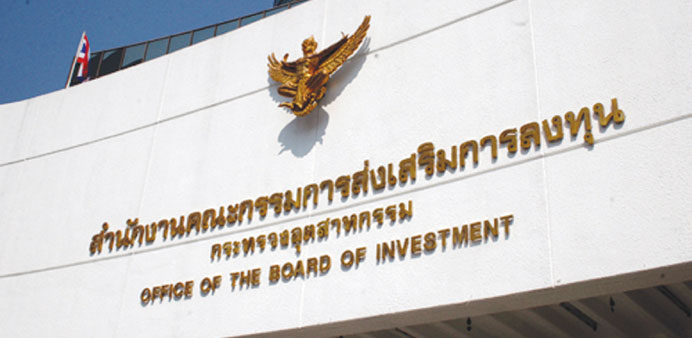Thailand’s Board of Investment (BoI) has started to work off a big backlog of investment applications that piled up since the coup d’etat and even said it wants to “accelerate the process of project approval to encourage private investment.” PICTURE: Arno Maierbrugger
By Arno Maierbrugger/Gulf Times Correspondent/Bangkok
The military government in Thailand has introduced desperately needed measures to lure foreign investors (back) to the country, which saw its attractiveness for international businesses sharply decline after political turmoil engulfed the kingdom and subsequently lead to a coup in May 2014. The result was that Thailand’s formerly healthy economic growth in 2014 slowed to the weakest pace in three years to just 0.7%, down from 2.9% in 2013, according to figures released by Thailand’s National Economic and Social Development Board on February 16.
Combined with a weak global economy, falling prices for agricultural commodities, a drop in tourism arrivals, delayed public investments in infrastructure after the military took over and ballooning household debt, Thailand currently goes through a difficult time. Irritated foreign companies, among them big investors such as Toyota and a number of electronics giants, have been publicly mulling to relocate factories to other Southeast Asian countries and put their investments in Thailand on hold. For small and medium businesses, the new government created uncertainty about the scope of influence foreign shareholders in a Thai company are allowed to have which would have prevented foreign control of many joint ventures and would have been a big backlash for many industries.
Meanwhile, the concerned ministries and investment institutions have obviously found out that such measures are counterproductive for the economy especially in the current environment. The Thai Ministry of Commerce has confirmed end-January that it has “no immediate plan” to amend the regulations regarding foreign shareholders “because it wants to facilitate foreign investment in the country.” Thailand’s Board of Investment (BoI) has started to work off a big backlog of investment applications that piled up since the coup d’etat and even said it wants to “accelerate the process of project approval to encourage private investment.”
Foreign and domestic firms submitted investment applications worth a combined $68bn in 2014, of which $31bn worth of projects were from foreign investors, according to the BoI. Under the new strategy, 23 projects worth $2.4bn, mainly in renewable energy and aviation, have been approved so far, the BoI said on February 12.
The current government has also revamped existing incentive structures to bring them on par with other Southeast Asian countries as some economists and officials in Thailand are beginning to feel that regional rivals such as Indonesia and the Philippines are pulling ahead. The new incentives are gearing towards international headquarters and international trading centres of foreign companies in Thailand, which now enjoy greater tax incentives on income and capital gains and a longer period during which those incentives are applicable, among others. All in all, the strategy offers a mix of non-tax, merit-based incentives and tax benefits, and removes zoning restrictions for foreign investors. The programme runs from January 2015 to December 2021, and the idea is to attract more greenfield investments in Thailand as well as to incentivise companies to relocate to Thailand and/or use their Thai base to expand to emerging countries in the region.
“This is obviously a good start for the current government to revamp the existing incentives and make them more attractive,” said Korneeka Koonachoak, partner at financial advisory firm Deloitte Thailand. “However, many people are still doubtful whether the government will achieve what it wants to achieve,” she added. “It may be too early to tell.”

